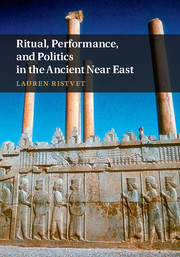Description
Ritual, Performance, and Politics in the Ancient Near East
Author: Ristvet Lauren
Lauren Ristvet rethinks the narratives of state formation by investigating the interconnections between ritual, performance, and politics in the ancient Near East.
Language: English
Approximative price 106.70 €
In Print (Delivery period: 14 days).
Add to cart
Publication date: 12-2014
331 p. · 18.2x26 cm · Hardback
331 p. · 18.2x26 cm · Hardback
Description
/li>Contents
/li>Biography
/li>
In this book, Lauren Ristvet rethinks the narratives of state formation by investigating the interconnections between ritual, performance, and politics in the ancient Near East. She draws on a wide range of archaeological, iconographic, and cuneiform sources to show how ritual performance was not set apart from the real practice of politics; it was politics. Rituals provided an opportunity for elites and ordinary people to negotiate political authority. Descriptions of rituals from three periods explore the networks of signification that informed different societies. From circa 2600 to 2200 BC, pilgrimage made kingdoms out of previously isolated villages. Similarly, from circa 1900 to 1700 BC, commemorative ceremonies legitimated new political dynasties by connecting them to a shared past. Finally, in the Hellenistic period, the traditional Babylonian Akitu festival was an occasion for Greek-speaking kings to show that they were Babylonian and for Babylonian priests to gain significant power.
1. Performing politics; 2. Movement; 3. Memory; 4. Tradition; 5. Community.
Lauren Ristvet is Assistant Professor of Anthropology at the University of Pennsylvania and Robert H. Dyson, Jr, Assistant Curator of Near Eastern Archaeology at the Penn Museum. She has directed archaeological surveys and excavations at major Bronze Age and classical period sites in Syria (Tell Leilan), Azerbaijan (Oğlanqala) and Iraq (Satu Qala). She is the author of In the Beginning: World History from Human Evolution to the First States (2007), and her articles have been published in journals including Antiquity, the American Journal of Archaeology, BASOR (the Bulletin of the American Schools of Oriental Research) and World Archaeology.
© 2024 LAVOISIER S.A.S.




